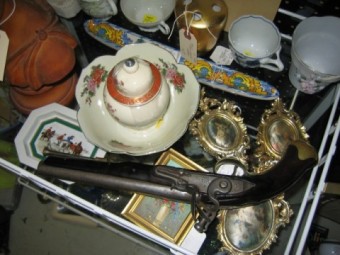How Could It Happen?

Going to the funeral of a long-time client is never a pleasant experience and this time it was particularly painful. The circumstances were tragic. My client, we’ll call him Phil, had died at the age of only fifty. Athletic, cheerful and outgoing, he had been diagnosed just a few months before as having a rare form of cancer. He tried to spend his last several weeks before going into hospice care putting his affairs in order, but time just simply ran out. I saw him just a few days before his death. As he had difficulty speaking, I took the major part of the conversation. Phil had been an avid naval collector with three rooms of his home dedicated to edged weapons, ship models, artwork and nautical artifacts spanning the era from the seventeenth century Dutch East India Company to the First World War Battle of Jutland (the “last proper sea engagement”, as he used to say). His reference library was encyclopedic in scope and content with many rare and out of print titles. Lying propped up in bed he asked, “Has anything new come into the gallery in my line?” We both laughed. He was a collector to the end.
About a year and a half after his death, I received a telephone call from his wife. She told me that she was preparing to sell the house and then said, “that there are a few things of Phil’s that you might be interested in having”. We set a time for me to drop by the house and look at the pieces. I arrived at the house at the appointed time. A realtor’s sign was in the front yard. Phil’s wife met me at the front door and asked me to come through to the living room. The house had changed. Of course, Phil wasn’t there and, as she explained to me, the house was being “staged” by the realtor for its first showing at the weekend. After talking about Phil and the tragedy of it all, she told me that she was trying to get on with her life. As I looked around the house, I asked if she had already started to move as I had noticed that there was little, if anything, of Phil’s collection in evidence. No, she replied, but through the summer she had organized four garage sales to dispose of what remained of “Phil’s hobby”. My heart sank. Then she explained that some people who “knew Phil through his hobby” had come by just a few weeks after the funeral and offered to buy some things “to help her out”. As she continued, I realized that they had paid her pennies on the dollar for the very best pieces in his collection. “The rest of the things” she said, “went very quickly in the garage sales. I put all of the books out at twenty-five cents each and a nice man who said he liked old books, bought almost eight tables full. He had to come back twice to get them all loaded into his van.” She then got up from her seat and, talking as she went into an adjoining room, said, “I just discovered these few things in a closet and thought that you might be interested in them - I just wish I’d found them before the last garage sale they’re so decorative”. On the coffee table she set down a cased London made sextant dated 1802, a perfect Ames marked M1860 cutlass, scabbard and frog and Civil War naval chapeau.
Now, I should make it clear that Phil’s wife was neither callous nor silly. She had attended a fine university and had only given up a promising career upon meeting Phil. She did not however share Phil’s passion or knowledge in collecting. She had always considered his collecting to be “Phil’s hobby”, a hobby that she knew little about. While Phil tried to arrange his affairs in his last few months, between treatments, giving up his job, sorting out insurance forms and all of the rest, time simply ran out. How could it happen? It simply does and, it happens more often than we might imagine.
For many collectors, the question of what will happen to their collection after their death can be an overwhelming worry. More often than not, surviving relatives have no concept of the true value of a collection, what to do with it or where to dispose of it. It can be a very harrowing time especially if the surviving spouse or children have not played an active part in forming the collection and have little idea as to its extent or current value. A reference library that has taken twenty years and untold thousands of dollars to build can, in a few short months, become a “bunch of books” that is “taking up space”. Perhaps worst of all, we have all heard truly dreadful accounts of so called “friends” suddenly appearing during a time of bereavement and offering to “help” by buying a collection, or individual items in a collection, most often at a fraction of the true value.
 How could it happen? It simply does. It happens, however, only if the collector fails to make some sort of provision for their collection and some guidance for their surviving family or executor. I would suggest, in the first instance, to have on hand a written record of your collection. It can be as simple as an accession log, that is, a bound ledger in which you list the object, from whom it was purchased, the purchase price and the date of acquisition. A separate column can indicate the sale of a piece so as not to confuse the issue when you are no longer about and able to explain the great sale or trade that you made! (Some collectors used a code when adding a new item to the record. Make sure your executor has access to the key to your code as well as passwords for any digital files or programs.) Such a record can be made much more elaborate with additional information, photos, appraisals, etc.; but in the first instance an accession log with the most basic information will be far superior to the often fictional stories of your buying prowess spun by family or friends when you are gone. Ideally, one might have a separate file - hard, digital or both - on every piece in your collection. Thankfully, there are numerous software programs available to assist every level of collector, from novice to advanced, in order to achieve this lofty goal, but this would be to speak of the ideal rather than the practical. Your prized reference books may, at the least, have the purchase price and date lightly penciled on to a flyleaf.
How could it happen? It simply does. It happens, however, only if the collector fails to make some sort of provision for their collection and some guidance for their surviving family or executor. I would suggest, in the first instance, to have on hand a written record of your collection. It can be as simple as an accession log, that is, a bound ledger in which you list the object, from whom it was purchased, the purchase price and the date of acquisition. A separate column can indicate the sale of a piece so as not to confuse the issue when you are no longer about and able to explain the great sale or trade that you made! (Some collectors used a code when adding a new item to the record. Make sure your executor has access to the key to your code as well as passwords for any digital files or programs.) Such a record can be made much more elaborate with additional information, photos, appraisals, etc.; but in the first instance an accession log with the most basic information will be far superior to the often fictional stories of your buying prowess spun by family or friends when you are gone. Ideally, one might have a separate file - hard, digital or both - on every piece in your collection. Thankfully, there are numerous software programs available to assist every level of collector, from novice to advanced, in order to achieve this lofty goal, but this would be to speak of the ideal rather than the practical. Your prized reference books may, at the least, have the purchase price and date lightly penciled on to a flyleaf.
Once you have at least a basic record of your collection, with, of course, the ability to log in new items, thought must be given to what will become of those items upon which you have lavished so much time, money, attention and care through the years. Perhaps you are fortunate enough to have a child or a spouse who has shared your passion. If so, a decision may be put off for a number of years or even a full generation. Otherwise, some thought must be given as to what will become of your collection. Bequests to family members, friends or even institutions will likely be a part of this process. For most of us, however, we will want to see the greater part of our collections return to the marketplace where they will by obtained by other like-minded collectors who will lavish the same care and attention upon those items that we had the opportunity to own for a time. There are various ways in which this can be accomplished. Collections may be placed at auction. They may be consigned to, or purchased by, dealers. In rare circumstances, a fellow collector who is knowledgeable as to its breadth and depth may acquire the entire collection. Whatever the manner of sale or dispersal, it is for you, the collector, to make your wishes known to those who will have the responsibility for carrying out those wishes.
So I urge you, the collector, to consider now what you would like to happen to your collection in the years to come and assist your partner or family by explaining the various options and ensuring that they, your executor and/or your lawyer, are aware of whom to contact should anything happen to you. For some years, in response to numerous requests, The Gentleman Soldier has assisted families and members of the legal profession in such matters. We have undertaken the appraisal of collections for executors. We have assisted in the sale of collections, both here and abroad, which has realized the best return for our clients and their families. We stand ready to offer further advice on these matters and can furnish forms and documentation to place with your family, executor and/or lawyer. If you would like further details as to this personal and confidential service, please do not hesitate to contact us.
In any case, don’t delay, unless, of course, you want your collection and its dispersal to be described starting with the words, “How could it happen?”